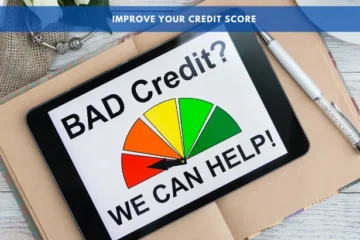Credit Repair Strategies for Different Types of Credit Problems
It is not a secret that credit has been essential to every individual for various reasons, including credit cards, obtaining loans, and even renting an apartment. Even the most responsible individuals experience credit repair problems. It can be missed payments, high credit utilization, or something else. Fortunately, various credit repair strategies exist for different types of credit repair problems.
Credit Repair Strategies for Common Credit Repair Problems
Late Payments
1. Negotiating with creditors– negotiating with your creditors to get a better payment plan is one option if you are struggling to pay your bills on time. They can set you up with a plan that best suits your budget and prevents you from being sent to collectors.
2. Automatic Payments- setting up automatic payments is the best strategy to avoid late payments. You can set up auto payments through your bank account, credit card, or directly with your creditor. This way, your payment will be automatically deducted from your account each month, ensuring you never miss any deadlines.
3. Payment Reminder– set-up a payment reminder on your phone, calendar, or email to help you remember to make payments on time. This is a helpful strategy if you have trouble keeping track of your due dates.
High Credit Utilization
1. Paying down debt is one of the most effective ways to reduce your credit utilization. Paying off debts will increase your available credit and lower your credit utilization ratio. It will soon help increase your credit score.
2. Increasing credit limit – request an increase on your credit limit. That way, you’ll have more credit available, and it will help lower credit utilization. And this can help to repair credit reports.
3. Balance transfer – transferring high-interest credit card debt to a lower-interest. It can help you pay your bills more manageably. However, it is essential to be mindful of any balance transfer fees and accumulate new debt on the card.
Errors in Credit Report
1. Checking credit report regularly– by checking your credit report regularly, you’ll be able to detect early any errors on your credit report. You can get your credit report for free on credit bureaus, Equifax and TransUnion.
2. Disputing errors– if there are any errors, you can dispute them. You can do this on your phone, by mail, or online. The bureau will then investigate and give you results within 30 days. The credit bureau will give you an updated credit report if the error is corrected.
3. Requesting a credit report correction– if the credit bureau did not correct the error, request a correction to be added to your credit report. Make sure that you will provide evidence to support your claims.
Bankruptcy
1. Understanding the impact of bankruptcy– There are two types of bankruptcy that individuals can file for Chapter 7 and Chapter 13. Chapter 7 bankruptcy involves liquidating assets to repay creditors, while Chapter 13 bankruptcy involves creating a repayment plan to repay creditors over three to five years.
2. Rebuilding credit after bankruptcy– rebuilding your credit after filing for bankruptcy is essential. Make sure to do it slowly. You can apply for a secured credit card or be an authorized user on someone else credit card. Taking out small loans can also help ensure you pay on time and start making responsible habits.
3. Seeking professional help– filing for bankruptcy is complex and overwhelming. If you think you cannot start again, don’t be afraid to seek professional help. They’ll guide you and ensure that you make informed decisions.
Credit Strategies For Less Common Credit Repair Problems
Defaulted Loans
1. Communicating with your lender- If you have defaulted on a loan, you first need to connect with your lender. Explain why you defaulted and your situation, and explore options like repayment loans or loan modification.
2. Loan rehabilitation– If you have multiple defaulted loans, you may consider consolidating your debts into one loan with a lower interest rate. Alternatively, you may explore debt settlement options to negotiate with lenders to settle your debts for less than the outstanding balance.
3. Seeking professional guidance– It is essential to seek professional guidance from a credit counselor or financial advisor to explore all options and make informed decisions.
Identity Theft
1. Placing fraud alerts and freezes on your credit report- You can request that the credit bureaus put a fraud alert on your credit report. This will notify potential creditors that you may be a victim of identity theft and to take extra precautions before approving any credit applications in your name.
2. Disputing fraudulent charges: If you notice any unauthorized charges on your credit card or bank statement, you should immediately dispute them with the respective company
3. Seeking legal assistance may include filing a police report, working with the credit bureaus and creditors to correct your credit report, or pursuing legal action against the thief.
Collections and Charge-Offs
1. Negotiating with collection agencies: You can contact the collection agency and try to negotiate an agreeable settlement for both parties. This may involve paying a lump sum or setting up a payment plan.
2. Paying off debts: This is often the best course of action if you have the means to pay off your debts in full. This will help improve your credit score and prevent further
3. Requesting removal of collections and charge-offs: If you have paid off your debts or negotiated a settlement with the collection agency, you can request that they remove the collections or charge-offs from your credit report. This may not always be possible, but it is worth asking.
Conclusion:
In conclusion, repairing your credit can be challenging, but it is crucial to achieving financial stability and freedom. Whether you are dealing with late payments, high credit utilization, errors in your credit report, bankruptcy, foreclosure, debt settlement, or defaulted loans, there are strategies you can use to address these issues and improve your credit score over time.
Remember, repairing your credit is a marathon, not a sprint. It may take time and patience, but with consistent effort and a commitment to responsible credit behavior, you can achieve your goals and enjoy the benefits of good credit.
Remember, repairing your credit is a marathon, not a sprint. It may take time and patience, but with consistent effort and a commitment to responsible credit behavior, you can achieve your goals and enjoy the benefits of good credit.
A credit repair company like Credit Repair Now can help you with your credit repair concern. Call us at +1 647-373-9651.




